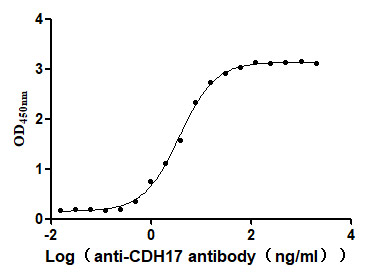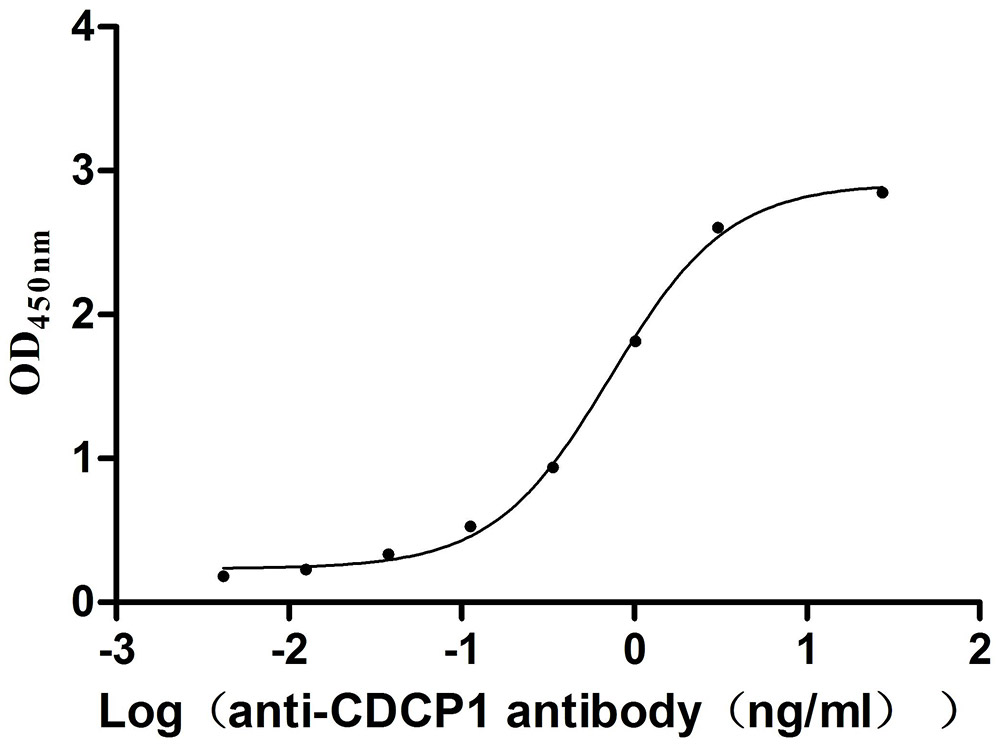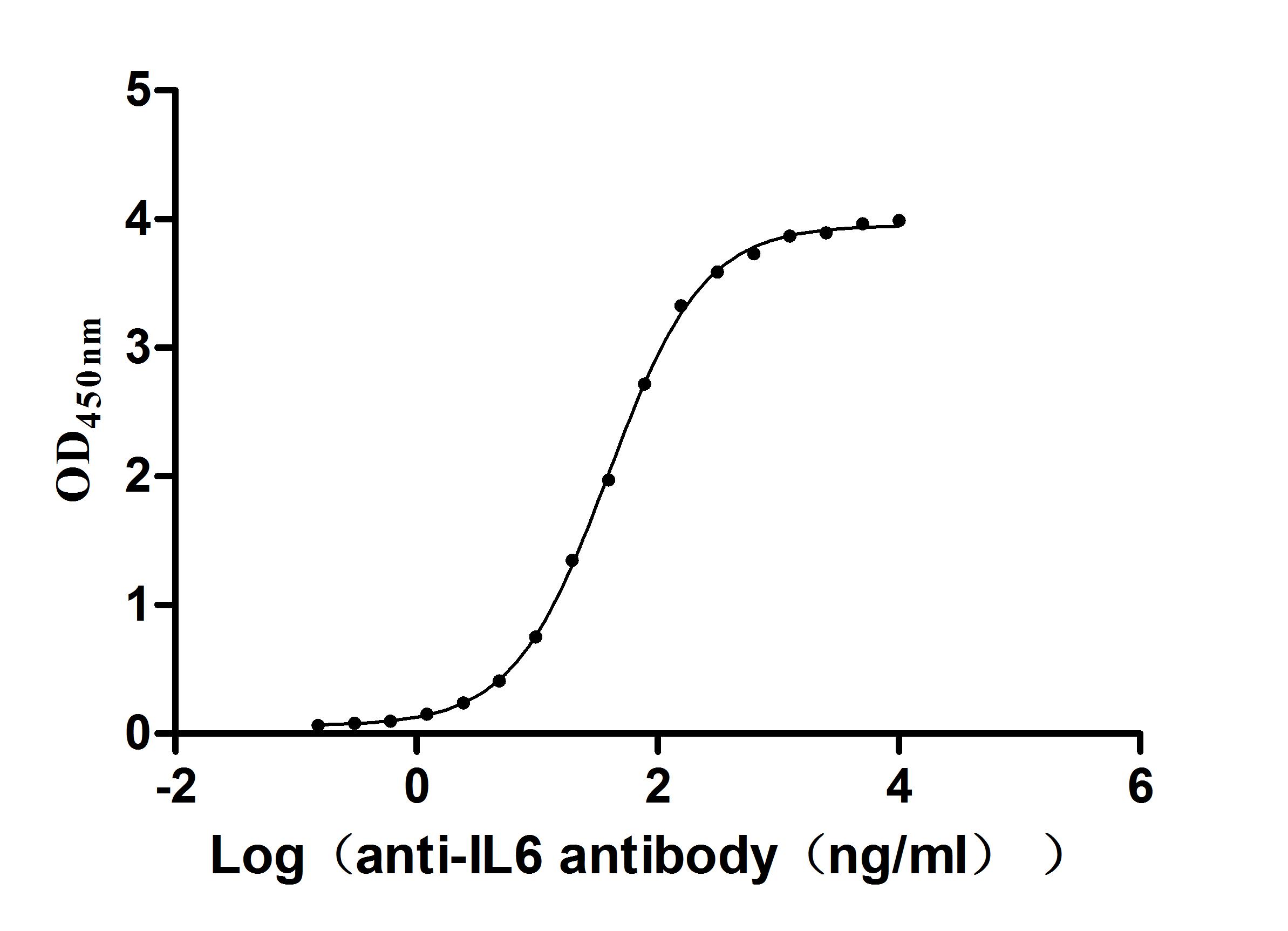Recombinant Human Myeloblastin (PRTN3)
-
货号:CSB-YP018830HU
-
规格:
-
来源:Yeast
-
其他:
-
货号:CSB-BP018830HU
-
规格:
-
来源:Baculovirus
-
其他:
-
货号:CSB-MP018830HU
-
规格:
-
来源:Mammalian cell
-
其他:
产品详情
-
纯度:>85% (SDS-PAGE)
-
基因名:PRTN3
-
Uniprot No.:
-
别名:ACPA; AGP 7; AGP7; AGP7 serine proteinase; Azurophil Granule Protein 7; C ANCA; C ANCA antigen; C-ANCA antigen; CANCA; EC 3.4.21.76; Leukocyte proteinase 3; MBN; MBT; MBT WEGENER AUTOANTIGEN; Myeloblastin; Neutrophil proteinase 4; NP 4 ; NP-4; NP4; P29; PR 3; PR-3; PR3; Proteinase 3; Proteinase3; PRTN 3; Prtn3; PRTN3_HUMAN; Serine proteinase neutrophil Wegener granulomatosis autoantigen; Serine proteinase; neutrophil; Wegener autoantigen; Wegener granulomatosis autoantigen
-
种属:Homo sapiens (Human)
-
蛋白长度:Full Length of Mature Protein
-
表达区域:28-248
-
氨基酸序列IVG GHEAQPHSRP YMASLQMRGN PGSHFCGGTL IHPSFVLTAA HCLRDIPQRL VNVVLGAHNV RTQEPTQQHF SVAQVFLNNY DAENKLNDVL LIQLSSPANL SASVATVQLP QQDQPVPHGT QCLAMGWGRV GAHDPPAQVL QELNVTVVTF FCRPHNICTF VPRRKAGICF GDSGGPLICD GIIQGIDSFV IWGCATRLFP DFFTRVALYV DWIRSTLR
-
蛋白标签:Tag type will be determined during the manufacturing process.
The tag type will be determined during production process. If you have specified tag type, please tell us and we will develop the specified tag preferentially. -
产品提供形式:Lyophilized powder
Note: We will preferentially ship the format that we have in stock, however, if you have any special requirement for the format, please remark your requirement when placing the order, we will prepare according to your demand. -
复溶:We recommend that this vial be briefly centrifuged prior to opening to bring the contents to the bottom. Please reconstitute protein in deionized sterile water to a concentration of 0.1-1.0 mg/mL.We recommend to add 5-50% of glycerol (final concentration) and aliquot for long-term storage at -20℃/-80℃. Our default final concentration of glycerol is 50%. Customers could use it as reference.
-
储存条件:Store at -20°C/-80°C upon receipt, aliquoting is necessary for mutiple use. Avoid repeated freeze-thaw cycles.
-
保质期:The shelf life is related to many factors, storage state, buffer ingredients, storage temperature and the stability of the protein itself.
Generally, the shelf life of liquid form is 6 months at -20°C/-80°C. The shelf life of lyophilized form is 12 months at -20°C/-80°C. -
货期:Delivery time may differ from different purchasing way or location, please kindly consult your local distributors for specific delivery time.Note: All of our proteins are default shipped with normal blue ice packs, if you request to ship with dry ice, please communicate with us in advance and extra fees will be charged.
-
注意事项:Repeated freezing and thawing is not recommended. Store working aliquots at 4°C for up to one week.
-
Datasheet :Please contact us to get it.
相关产品
问答及客户评论
Is there an alternative that you currently offer for this product (Myeloblastin protein). ?
The expression of the previous protein is not very good, so we discontinue it. If you want the previous region, we will optimize and re-develop it.
The prices will be higher and the lead time will be longer, and the catalog numbers have been updated as follows.
Recombinant Human Myeloblastin(PRTN3)
CSB-YP018830HU >> Yeast
CSB-EP018830HU >> E.coli
CSB-BP018830HU >> Baculovirus
CSB-MP018830HU >> Mammalian cell
Expression Region: 28-248aa; Full Length of Mature Protein
Tag Info: EP, BP, MP: N-terminal 10xHis-tagged and C-terminal Myc-tagged; YP: N-terminal 6xHis-tagged
Expression Sequence:
IVGGHEAQPHSRPYMASLQMRGNPGSHFCGGTLIHPSFVLTAAHCLRDIPQRLVNVVLGAHNVRTQEPTQQHFSVAQVFLNNYDAENKLNDVLLIQLSSPANLSASVATVQLPQQDQPVPHGTQCLAMGWGRVGAHDPPAQVLQELNVTVVTFFCRPHNICTFVPRRKAGICFGDSGGPLICDGIIQGIDSFVIWGCATRLFPDFFTRVALYVDWIRSTLR
Can you let me know if this protein is expected to be active
靶点详情
-
功能:Serine protease that degrades elastin, fibronectin, laminin, vitronectin, and collagen types I, III, and IV (in vitro). By cleaving and activating receptor F2RL1/PAR-2, enhances endothelial cell barrier function and thus vascular integrity during neutrophil transendothelial migration. May play a role in neutrophil transendothelial migration, probably when associated with CD177.
-
基因功能参考文献:
- PR3 is involved in triggering inflammatory pathways, disrupting cellular signalling, degrading key structural proteins, and pathogen response.PR3 dysfunction may play a critical role in many processes central to the pathophysiology of COPD and other chronic neutrophilic human diseases. PMID: 30236095
- Characterization of the CD177 interaction with the ANCA antigen proteinase 3 responsible for autoimmune diseases has been reported. PMID: 28240246
- Our results demonstrate that in the early stage of sepsis, JMJD3 contributes to high levels of neutrophil mPR3 expression and thereby to the production of the inflammatory cytokine IL-1beta PMID: 29621735
- A few peptides bound to proteinase 3 (PR3) hydrophobic pockets and inhibited PR3 binding to lipids, while the (KFF)3K d-peptide inshowed a significant affinity for the lipids. PMID: 29132840
- Studies indicate that the premature activation of proteinase 3 (PR3) would seriously harm the cell by its protease activity. PMID: 27559009
- this study shows that transgenic mice expressing human Proteinase 3 exhibit sustained neutrophil-associated peritonitis PMID: 29079698
- unique structural and functional characteristics of PR3 might be key contributors to the systemic inflammation and to the immune dysregulation observed in granulomatosis with polyangiitis. PMID: 28546501
- Our findings demonstrate how RAGE-PR3 interactions between human prostate cancer cells and the bone marrow microenvironment mediate bone metastasis during prostate cancer progression PMID: 28428279
- PRTN3 variants are associated with ANCA-associated vasculitis risk. PMID: 28029757
- Clinical manifestations varied ANCA-associated vasculitis categories, and neither MPO-ANCA nor PR3-ANCA significantly affected relapse of AAV. PMID: 28339364
- Changes in the DNA methylation status of the PRTN3 promoter may predict the likelihood of stable remission and explain autoantigen gene regulation PMID: 27821628
- Study shows that MPO and PRTN3 in neutrophils of Anti-neutrophil cytoplasmic autoantibody (ANCA)-associated vasculitis (AAV) patients with active disease have a distinct pattern of histone modifications, which implicates epigenetic mechanisms in regulating expression of autoantigen genes and suggests that the epigenome may be involved in AAV pathogenesis. PMID: 27752292
- The levels of both NE and PR3 correlated with absolute neutrophil counts and are reduced in type 1 diabetes mellitus patients. PMID: 26939803
- Report prognostic value of proteinase-3-antineutrophil cytoplasmic antibody in patients with idiopathic interstitial pneumonias. PMID: 26873743
- Molecular simulations suggest that PR3 interacts with phosphatidylserine via a small number of amino acids, which engage in long lasting interactions with the lipid heads. As phosphatidylserine is a major component of microvesicles (MVs), this study also examined the consequences of this interaction on MV production and function. PMID: 26961880
- miR-634 mimics induced a proinflammatory phenotype in monocyte-derived macrophages, with enhanced expression and release of ADAM17 and IL-6 in Proteinase-3 ANCA-Associated Vasculitis PMID: 25788529
- The PR3-induced microenvironment facilitated recruitment of inflammatory cells, such as macrophages, plasmacytoid DCs (pDCs), and neutrophils, which were observed in close proximity within granulomatous lesions in the lungs of GPA patients. PMID: 26436651
- ACPA negative rheumatoid arthritis shares the genetic susceptibility loci with ACPA positive disease. PMID: 25927497
- Data suggest that targeting proteinase-3 (PR3) specific effector memory cells, to prevent relapse, and instituting anti IL-17 therapy, or modulating Tregs could be newer forms of therapy for granulomatosis with polyangiitis (GPA). PMID: 25461407
- Anti-PR3 autoantibodies not detected in sera of patients with pulmonary tuberculosis. PMID: 24719228
- these results highlight a potentially important role for proteinase 3 in emphysema. PMID: 25416382
- The data shows that the neutrophil protease PR3 is a direct modulator of human platelets and causes shape change through activation of the Rho/Rho kinase and Ca(2+) signaling pathways. PMID: 24993595
- These in vivo data provide, for the first time, compelling evidence of the collateral involvement of cathepsin G, NE, and proteinase 3 in cigarette smoke-induced tissue damage and emphysema PMID: 24929239
- Proteinase 3-mediated caspase-3 activation controls neutrophil spontaneous death PMID: 25180606
- Elevated levels of GCF proteinase 3 in CP, G-AgP, and gingivitis might suggest that proteinase 3 plays a role during inflammatory periodontal events in host response. PMID: 24949444
- Circulating protein levels and enzymatic activity of PRTN3 are markedly elevated in patients with type 1 diabetes mellitus, and are correlated with increased autoantibodies against beta-cell antigens. PMID: 25092677
- It reports the synthesis and enzymatic studies on a new proteinase 3 intermolecular quenched substrate with enhanced selectivity over neutrophil elastase. PMID: 23911525
- The presence of ANCA in the bile of patients with primary sclerosing cholangitis (PSC) is a novel finding and highly suggestive of PSC. Biliary IgG ANCA correlates with the severity of bile duct strictures. PMID: 23957616
- Lateral flow assay for the determination of IgG-autoantibodies to Pr3. PMID: 24291125
- Proteinase 3-anti-neutrophil cytoplasmic antibody (ANCA) serum and cerebrospinal fluid (CSF) levels are used as a marker for the more severe form of hypertrophic pachymeningitis. PMID: 24271323
- Neutrophil elastase and proteinase-3 trigger G protein-biased signaling through proteinase-activated receptor-1 (PAR1). PMID: 24052258
- Proteinase 3 may play a greater role in alpha-1-antitrypsin deficiency and COPD PMID: 22936713
- Changes in proteinase 3 anti-neutrophil cytoplasm autoantibody levels in early systemic granulomatosis with polyangiitis (Wegener's) may reflect treatment rather than disease activity. PMID: 23380137
- Neutrophil proteinase 3 plays a significant role in promoting vascular integrity by signaling through endothelial cell PAR-2. PMID: 23202369
- PAR signaling and serine protease-induced alterations in endothelial function modulate glomerular inflammation via parallel but independent pathways PMID: 22952809
- Some anti-PR3 responses are highly variable across donors. PMID: 22791638
- Membrane PR3 expressed on apoptotic neutrophils might amplify inflammation by affecting the anti-inflammatory "reprogramming" of macrophages. PMID: 22844112
- Early plasma exchange in addition to cyclophosphamide/glucocorticoid treatment improves outcome in PR3-ANCA-positive renal vasculitis. PMID: 22510451
- PR3 expression and activity are significantly increased on transmigrating neutrophils; PR3 and NB1/CD177 interactions may play a role in aiding neutrophil transmigration. PMID: 22266279
- Proteinase 3 carries small unusual carbohydrates and associates with alphalpha-defensins. PMID: 22138257
- the dual functions (activation/termination) of PR3 in IL-33 biological activity. PMID: 22270365
- the activity of myeloblastin was significantly altered in the lung adenocarcinoma biopsies harboring a KRAS gene mutation. PMID: 22210048
- membrane-bound PR3 acts as a non-opsonic phagocytosis receptor for bacteria probably by activating PAR2 in neutrophils PMID: 21700341
- Suggest that in Wegener's granulomatosis and Churg-Strauss syndrome the cytokine response of the total CD4+ T-cell population and PR3-specific cells is influenced by the underlying disorder. PMID: 21470489
- neutrophil elastase (NE) and proteinase-3 are capable of almost complete degradation of hemoglobin in vitro PMID: 21193404
- pivotal role of the NB1-Mac-1 receptor interaction for PR3-ANCA-mediated neutrophil activation PMID: 21193407
- healthy individuals have masked circulating, noncross-reactive, antigen-specific natural autoantibodies against MPO, PR3, and GBM in their serum and IgG fraction PMID: 20592714
- The trafficking of precursor NE (proNE) and precursor PR3 (proPR3), was compared. PMID: 20828556
- cANCAs from Wegener's granulomatosis patients at least in part recognize similar surface structures as do mouse monoclonal antibodies and compete with the binding of alpha1-protease inhibitor to PR3. PMID: 20530264
- The increased membrane expression of PR3 found in ANCA-associated systemic vasculitis is not linked directly to circulating PR3 or PR3 gene transcription, but is dependent upon CD177 expression and correlated with the transcription of the CD177 gene. PMID: 20491791
显示更多
收起更多
-
相关疾病:Is the major autoantigen in anti-neutrophil cytoplasmic autoantibody (ANCA)-associated vasculitis (Wegener's granulomatosis) (PubMed:2377228, PubMed:2679910). This complex, systemic disease is characterized by granulomatous inflammation with necrotizing lesions in the respiratory tract, glomerulonephritis, vasculitis, and anti-neutrophil cytoplasmatic autoantibodies detected in patient sera (PubMed:2377228, PubMed:2679910). PRTN3 causes emphysema when administered by tracheal insufflation to hamsters (PubMed:3198760).
-
亚细胞定位:Cytoplasmic granule. Secreted. Cell membrane; Peripheral membrane protein; Extracellular side. Membrane raft; Peripheral membrane protein; Extracellular side.
-
蛋白家族:Peptidase S1 family, Elastase subfamily
-
组织特异性:Expressed in polymorphonuclear leukocytes (at protein level). Expressed in neutrophils (at protein level). Expressed in differentiating neutrophils.
-
数据库链接:
HGNC: 9495
OMIM: 177020
KEGG: hsa:5657
STRING: 9606.ENSP00000234347
UniGene: Hs.928
Most popular with customers
-
Recombinant Human Hepatocyte growth factor receptor (MET), partial (Active)
Express system: Mammalian cell
Species: Homo sapiens (Human)
-
Recombinant Human Melanoma-associated antigen 4 (MAGEA4) (Active)
Express system: Mammalian cell
Species: Homo sapiens (Human)
-
Recombinant Human Claudin-6 (CLDN6)-VLPs (Active)
Express system: Mammalian cell
Species: Homo sapiens (Human)
-
Recombinant Human Cadherin-17 (CDH17), partial (Active)
Express system: Mammalian cell
Species: Homo sapiens (Human)
-
Recombinant Mouse CUB domain-containing protein 1 (Cdcp1), partial (Active)
Express system: Mammalian cell
Species: Mus musculus (Mouse)
-


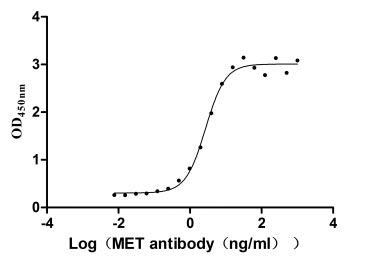
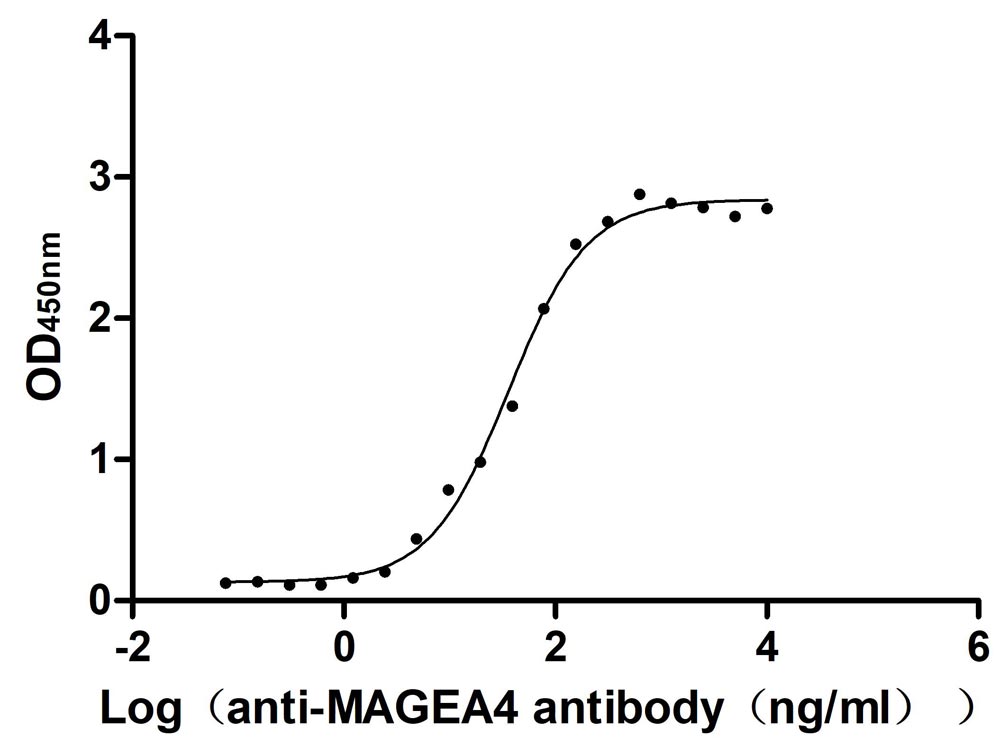
-AC1.jpg)
